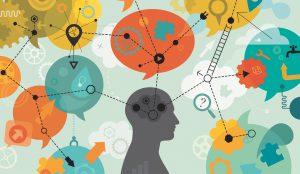Submitted by Hospice of Marion County
 Have you ever had a ‘senior moment’ — momentarily forgetting why you walked into a room, forgetting where you put something? You laugh about it, calling it an age-related problem, but later wonder was it really a temporary lapse in memory or could it be something more serious? You are not alone. We all do that from time to time and it is usually nothing to worry about. However, there are things to look for when it is time to take a closer look.
Have you ever had a ‘senior moment’ — momentarily forgetting why you walked into a room, forgetting where you put something? You laugh about it, calling it an age-related problem, but later wonder was it really a temporary lapse in memory or could it be something more serious? You are not alone. We all do that from time to time and it is usually nothing to worry about. However, there are things to look for when it is time to take a closer look.
When is it a serious memory problem?
If you do not remember your own phone number or address, or forgetting things on a regular basis that your spouse or family member has noticed is an increasing frequency, then you may want to seek further evaluation from your physician. These scenarios could be an indication of memory decline versus a momentary senior moment:
• You lose your car in the parking lot because you forgot the color, make or model.
• You have always had a remarkable memory and now you cannot remember anything.
• You get lost in places you should know well.
• You repeat yourself or ask the same questions over and over.
• You are confused about people you should know.
• You are confused about time or unable to tell time.
With mild cognitive impairment (MCI), patients are more likely to develop dementia. Although there are many different types and causes of dementia, the four most common are: Alzheimer’s, Vascular, Frontotemporal, and Lewy Body. Depending on the diagnosis, the progression varies.
How the brain stores memories
Information we take in goes through three stages: 1) encoding, 2) storage and 3) retrieval. Our brains are like a computer that stores memories in different categories: recent–what you ate for breakfast; short-term—the name of a person you met moments ago, and long-term–memories of your childhood. It is the most complex organ of the body that controls every process that regulates our body and consists of about eighty-six billion neurons.
Scientists estimate that the human brain will hold up to one quadrillion pieces of information over the course of a lifetime.
Aging affects our memory and begins in our twenties. A few cells at a time are lost, with fewer chemicals produced that help the brain function. The older you are, the more these changes affect the memory. There are also changes in the way memories are stored, making it harder to recall information. Other conditions that can affect memory include depression, side-effects of drugs, strokes, head injuries and alcoholism.
Here are some ways to help improve your memory:
• Make lists, use notes.
• Stick to routines and use calendars.
• Make associations to connect things in your mind.
• Put frequently used items in the same place each time.
• Learn new things, do brain games, learn a new language.
• Exercise, meditation, and deep breathing also helps.
• Hydration is important.
• Preventative measures such as stop smoking, drink alcohol in moderation.
• Sleep is especially important, regenerative and restorative.
Living with a loved one’s dementia
Hospice of Marion County offers Dementia Caregiver Workshops along with sensitivity training which enables caregivers to have a better experience with their loved one. This training includes the Virtual Dementia Tour® which helps caregivers understand the challenges people living with dementia face daily, including Teepa Snow’s Positive Approach® techniques which teaches HOW to live in a relationship with someone living with dementia. If you are interested in attending this workshop, contact the Nancy Renyhart Dementia Education Program at (352) 291-5138. Classes are offered monthly in the Elliott Center.
Visit HospiceofMarion.org for more info.
 Central Florida Health and Wellness Magazine Health and Wellness Articles of the Villages
Central Florida Health and Wellness Magazine Health and Wellness Articles of the Villages



